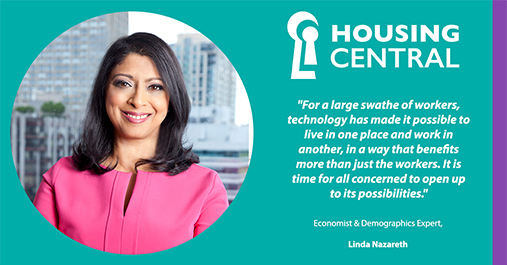Our members provide safe, secure and affordable homes. Below is a sneak peek of what economist and demographics expert Linda Nazareth will be sharing at the 2018 Housing Central Conference.
Living and working in the same community sound lovely, and maybe it could be. If you could live in a sweet and affordable cottage by the seaside and work close to home that would be awesome. Or if you worked in a big, bustling city and could afford an amazing condo right by you work, that would be awesome too. Where it all falls apart is when you have the city job and cannot afford the condo and the cottage is too far to commute from. Or when you have the cottage but there is no viable job close to where you live. Or when you decide that yes, you can make the cottage work and then find that the commute to the job is somewhere between impractical and life-draining.
It does not have to be this way. For a large swathe of workers, technology has made it possible to live in one place and work in another, in a way that benefits more than just the workers. Unfortunately, however, telecommuting has always been regarded suspiciously, particularly by employers who wonder if out-of-sight employees are secretly binge-watching the latest hot cable series. It is time for all concerned to open up to its possibilities.
At the moment, unemployment rates are the lowest that they have been in decades, and business lament the lack of workers: surely then being able to choose from a larger geographic pool would be good for them. Of course that would have to be managed properly, and not just because Netflix exists. Rather there is an actual ‘water cooler effect’ that happens when you get workers together and they are able to share ideas and replicating that with remote workers is more difficult. Difficult but not impossible: from quarterly in-person meetings through to teleconference-baby-showers, there are plenty of ways that smart companies make telecommuting work.
There are plenty of other societal benefits to telecommuting as well. The environment would certainly benefit if fewer people were travelling to work, and there would be a lot less mental stress on those enduring the long commutes. And of course there is the issue of housing.
Right now, housing near cities prohibitively expensive and rising quickly. And why would it not be? That is where the jobs are, and people need to move to them. As they do, city and suburban population grows, and there is pressure on housing prices. Nothing will change until we break the model completely, and give up the idea that going into work every day is a requirement of holding a job.
